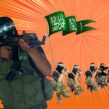
Kurdish Hezbollah Targets the Fethullah Gulen Movement
Publication: Eurasia Daily Monitor Volume: 6 Issue: 78
By:

On April 8 Fethullah Gulen, the leader of the moderate Islamist neo-Nur movement (a Sufi Islamist network that follows the path of Islamist thinker Said Nursi who died in 1960), released a surprising statement. Gulen drew attention to a possible "social engineering" campaign about the risk of an internal Islamist threat. He gave examples from the period of the "February 28" military coup during which radical Islamist groups such as Aczimendi, Kurdish Hezbollah (KH), were regularly televised on the streets during this period. Gulen also claimed that in this period Hzibulvahset, "Party of Murderers," (referring to KH) had played a significant role in spreading fear amongst the population. He pointedly suggested that "there is a looming danger that Muslims who have nothing to do with violence could be labeled as ‘terrorists’ through penetrating into Islamist networks and using violence as if they are members of groups advocating such tactics"(Radikal, April 8).
Shortly after Gulen’s statement, the Turkish Chief of General Staff Ilker Basbug, stated that Islamist networks posed a potentially dangerous threat to the country (www.tsk.mil.tr, April 14). Political commentators believe that Basbug specifically targeted the Gulen movement in his speech (Sabah, April 15).
While the followers of Gulen are searching for an adequate response to Basbug’s statement, a forceful and much more dangerous statement toward movement emerged from the KH. Its press statement argued:
"The Gulen movement with its media outlets, attacks the followers of Hezbollah. In recent days these attacks are extending into TV series that are broadcast on Gulen’s TV channels, and his recent statement was a direct attack on the followers of Hezbollah. Despite the fact that Hezbollah would easily eliminate the Gulen movement in the Kurdish region if there is any clash between the two, HT will not be part of any violent clash. There is danger of using Hezbollah’s name and attacking the Fethullah Gulen movement. We declare that we will not, under any circumstances, attack on this movement" (www.hurseda.com, April 19).
KH’s concerns over the Gulen movement are not a new phenomenon. Since the launch of its new strategy in 2005 to reach out to the Kurdish region, KH has considered the Gulen movement to be a threat to its existence. As the dominant Kurdish Islamist organization, the KH wants to maintain its position. However, the Gulen movement, which is a predominantly Turkish organization, has extended its influence into the Kurdish region by opening new reading rooms, private schools and business organizations. It has consequently become a serious actor in shaping Kurdish political identity within the region, which is precisely what the KH wants to prevent. In its recent press release, the KH leadership expressed its dissatisfaction over the Gulen movements’ recent activities in the Kurdish region (www.yesrip.com, April 22).
Indeed the KH media has labeled the Gulen movement as a "mischief maker" (www.hurseda.com, April 23). It appears that both of these Islamist groups have now entered a new and potentially dangerous period, denoted by their appetite for attacking each other. The Bugun daily revealed that weapons were seized in Hezbollah’s hide outs which belonged to the gendarmerie (Bugun, April 21).
The KH emphatically rejects these claims saying: "Hezbollah members that are alleged to hide those weapons in their houses are the victims of a conspiracy that was set up by the gendarmerie. Gendarmerie forces first detained some Hezbollah members and while they were not at home gendarmerie forces hid the weapons -then launched their operations" (www.hurseda.com, April 22).
Aksion weekly news magazine -which is close to the Gulen movement- alleged that the KH is attempting to penetrate moderate Islamist networks (Aksiyon, April 20). Predictably, the KH refutes such allegations as an attempt to curb its growing influence within the Kurdish region (www.hurseda.com, April 22).
It appears that these movements are intensifying their bitter campaigns against each other. The KH is believed to have ties with al-Qaeda within Turkey, which will complicate any future decision to activate a violent strategy to counter the influence of the Gulen movement. It would mark the first instance in which a radical Islamist organization has declared a "jihad" against a moderate Islamist group. In this context, it is equally risky that Turkish generals consider the Gulen movement as a potential target, rather than exploring ways of defusing these tensions. It is unclear whether such a confrontational policy will upset Turkey’s delicate internal security balance.




